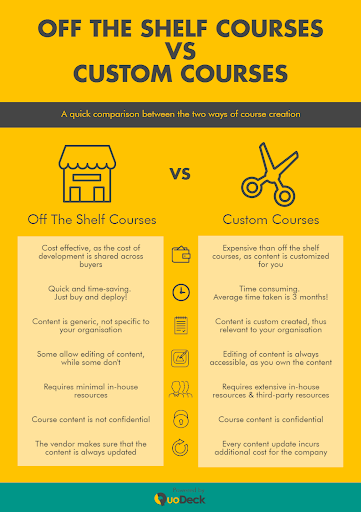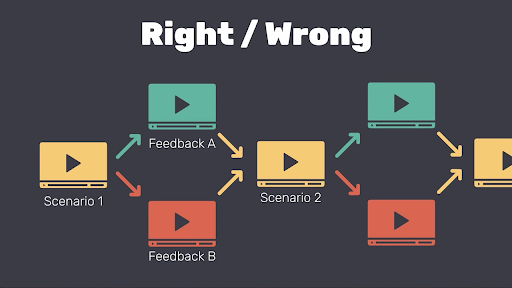As more and more organizations turned to online learning to train their employees, the demand for off-the-shelf courses grew exponentially.
However, businesses soon understood that that was not a great solution in the long term and that custom elearning development is more to their liking.
In this blog post, we will be talking about one of the most important custom elearning solutions out there — scenario based training and its different types you can use to make learning engaging and fun.
Off-The-Shelf Courses Can’t Meet The Needs Of Organizations In 2023
While off-the-shelf course content has been popular in the short term, custom elearning solutions help meet the needs of organizations in 2023.
Here are a few reasons why:

1. Increased Demand For Personalization:
In today’s digital world, employees are used to having a tailored experience.
They expect that their learning experience should be personalized to their specific needs and that it should be tailored to their role or job function.
Off-the-shelf courses cannot provide this level of customization. Therefore, organizations that want to provide an engaging and effective learning experience will have to invest in personalized content.
2. The Need For A More Engaging Experience:
Off-the-shelf courses often lack interactivity and engagement.
According to a report, 49% of L&D professionals say the skills gap is wider in their organization.
This calls for immediate employee training that’s engaging and informational.
Off-the-shelf courses often are anything but.
They are typically presented as a series of slides or videos without any interactive elements.
In 2023, organizations will demand a more exciting and interactive learning experience.
This will require the use of more interactive elements, such as gamification, simulations, and virtual reality.
3. Increased Need For Measurement And Evaluation:
Off-the-shelf courses also lack sophisticated analytics and reporting capabilities.
Or, to put it in other words — they don’t always measure what YOU want to measure.
Organizations want to know how their employees are performing and where there is room for improvement.
Or you want to focus on a specific metric and remove all the others, which only makes the analysis cluttered.
Scenario-Based Is A Customizable And Effective Training
According to a report, 49% of L&D professionals say their executives are concerned employees do not have the right skills.
In this regard, scenario-based training is one of those custom elearning solutions that can help teach your employees important skills and help them apply them to their work.
With this type of training, your employees can practice skills in a safe and controlled environment while learning the necessary knowledge and strategies to apply those skills in the workplace.
This type of training is especially beneficial for organizations that need to train large numbers of employees quickly and effectively.
Because it is simulation-based, it allows employees to learn without having to face the risks associated with a real-life situation.

Scenario-Based Training Comes In Different Forms
At its essence, scenario-based training requires learners to put themselves into the shoes of someone else and think through the various possible solutions to a problem.
Through this process, learners learn to identify the best course of action, as well as appreciate the potential consequences of their decisions.
From multiple-choice questions to fully immersive scenarios set in a virtual environment, learners can engage in the learning process on multiple levels.
- When learners are presented with a mini-scenario, they must read the scenario and answer one or more multiple-choice questions. This type of training helps learners understand the key elements of the problem and identify the most appropriate solution.
- More advanced training comes in the form of branching scenarios. These scenarios are much longer and more complex, with multiple possible outcomes and solutions. They allow learners to explore different paths and observe how their decisions affect the outcome of the situation. This type of training requires learners to really engage with the situation and think critically about their decisions.
- Finally, some training programs offer fully immersive virtual environments. This type of training allows learners to experience the situation first-hand. The immersive environment provides learners with a visceral understanding of the situation and allows them to fully appreciate the impact of their choices.
Scenario-based training is an incredibly powerful tool for learning.

Through its various forms, learners can engage with the learning process on multiple levels.
They can explore different solutions, observe the consequences of their decisions, and gain a deeper appreciation of the situation.
No matter the form, scenario-based training is an invaluable tool for learners of all levels.
Bottom Line
In conclusion, off-the-shelf courses are not effective enough to meet the needs of organizations in 2023 or the future.
Scenario-based training is a more effective alternative that can be tailored to the specific needs of an organization.
It can provide a more immersive and engaging experience for learners, making it a valuable tool for organizations that want to provide quality training for their employees.
To learn more about online content development, click here.

